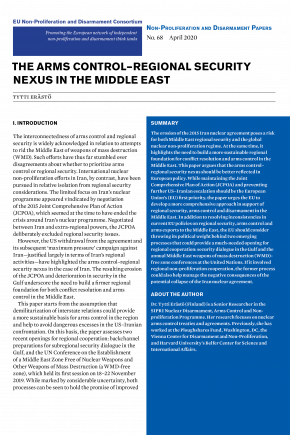The independent resource on global security
The Arms Control–Regional Security Nexus in the Middle East
The erosion of the 2015 Iran nuclear agreement poses a risk for both Middle East regional security and the global nuclear non-proliferation regime. At the same time, it highlights the need to build a more sustainable regional foundation for conflict resolution and arms control in the Middle East. This paper argues that the arms control– regional security nexus should be better reflected in European policy. While maintaining the Joint Comprehensive Plan of Action (JCPOA) and preventing further US–Iranian escalation should be the European Union’s (EU) first priority, the paper urges the EU to develop a more comprehensive approach in support of regional security, arms control and disarmament in the Middle East. In addition to resolving inconsistencies in current EU policies on regional security, arms control and arms exports to the Middle East, the EU should consider throwing its political weight behind two emerging processes that could provide a much-needed opening for regional cooperation: security dialogue in the Gulf and the annual Middle East weapons of mass destruction (WMD)-free zone conferences at the United Nations. If it involved regional non-proliferation cooperation, the former process could also help manage the negative consequences of the potential collapse of the Iran nuclear agreement.

